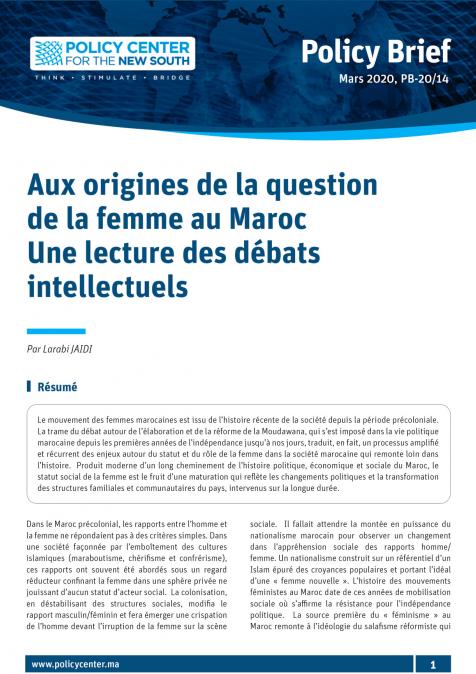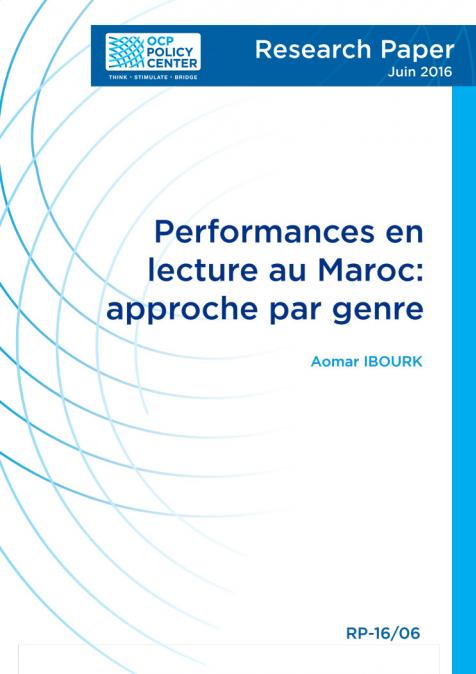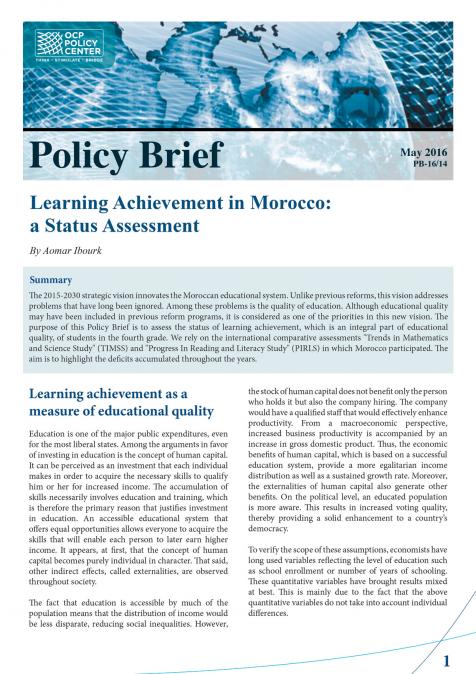Publications /
Opinion
Is Education in crisis worldwide? It surely is a fundamental issue of national and international development for Morocco’s policy makers. Recent reforms point to a key moment and momentum builder in public policy and policy implementation for the Kingdom. Policy makers agree that Education touches on fundamental themes of development economics as well as cognitive growth and ethics. It is behind human capital accumulation, and thus productivity and economic growth benefits from international trade and cooperation, facilitates the absorption of new technologies and therefore influences how our lives and working processes evolve. It also relates to a moral concern to provide opportunities for all individuals and social improvement. Education illustrates the challenges to link progress in theoretical development economics to practical policy design and operationalization. Naturally, working on Education reform involves: (i) analytical work testing the appropriate models with the best data; (ii) project or policy design using the previous results; (iii) implementation of the most effective project or policy; and (iv) evaluation of outcomes. But Education is more: it also has (v) an ethical dimension, providing quantity and quality educational opportunities for all. In sum, Education - as part of poverty and inequality reduction strategies - needs to be effective and socially inclusive. It is rarely a one-size-fits-all, which is why its projects and policies need to be designed by assessing local conditions, collaborating with communities and always understanding issues from different cultural standpoints. In some instances, a common “blueprint” or a “good recipe” can be retained and adapted to local circumstances. For example, in many developing countries, the objective is to increase universal coverage in primary and secondary education while reducing poverty. However, as noticed in both Morocco, middle-income countries, and industrialized economies, this widespread enrollment strategy is now putting tremendous pressures on labor markets that show too little absorptive capacity.
So, education policies require open and new mindsets. Learning tools and technologies are rapidly shifting and can be used outside, inside, or by the schools and classrooms to facilitate each child’s learning experience. Today, we are witnessing shifting labor markets resulting from the rise of automation and massive increases in enrollment rates. This in putting tremendous pressures on our economies and societies. Moreover, what children get from the education system today is not fully providing them with the skills and tools they will need tomorrow. Policy makers and political leaders do not fully grasp what the future holds for us in terms of labor market structures and job opportunities. Many studies regarding the above-mentioned drifts exist and more will be needed. More data collection tools and innovative analytical approaches linked to this shift are required in order to properly monitor and evaluate the different public policies meant to address the Second Machine Age we have entered. This will require partnering not only with local governments, but also with NGOs, and the private sector to rethink the role and financial needs of the different levels of education.
Education policies, given the ongoing technological transformations, will also require for Morocco to develop and implement innovative funding mechanisms that support the different complexities each layer of its education system has, while adapting to such a rapid-changing global context. Recent studies are suggesting that changes and improvements in teacher’s pedagogy, infrastructure, and school governance are key pillars to transforming Morocco’s education system. In the wake of a new collaboration between OCPPC and Institut Montaigne, both think tanks joined forces to focus on more specific issues. Speakers alongside various Senior Fellows of the OCP Policy Center and experts, agree that both the French and Moroccan education system need a serious makeover. Both still seem to produce high quality education for specific segments of society at the expense others. And yet, both still face difficulties finding ways to use education as a platform toward employment for all. In addition, both think tanks realize that this type of system is no longer sustainable given the various above-mentioned changing local and global contexts.
This new global context is challenging for the multilateral approach advocated and developed in the past. International and local cooperation, working with countries and local communities to solve global issues is less in fashion. Well-known accumulated problems of inequality, structural transformation, changes in job structures are shaping new trends. As experts point to a global political transformation leaning towards more protectionist and nationalist socio-economic policies, changing structures and mindsets, to favor cooperation for example, are of utmost urgency. Incidentally, many believe education at all levels can facilitate such processes. Countries, today, need and want to do their own homework: maintaining macroeconomic and financial stability while building and ensuring stable institutions that guarantee the rule of law, transparency and checks-and-balances. For that to happen, reinvesting in human capital needs to become a greater priority. In Morocco, a careful sequencing of the various reform agendas is part of the debate. Only time will tell whether policy makers and politicians are able to keep up with the pace of technological advancements to successfully use innovative tools in and out of the classroom. With that in mind, collaboration between OCPPC and the Institut Montaigne will generate news ideas that challenge old ones.









